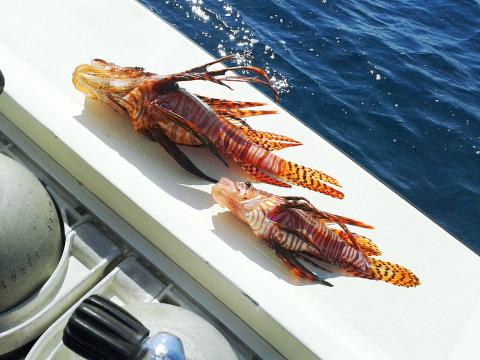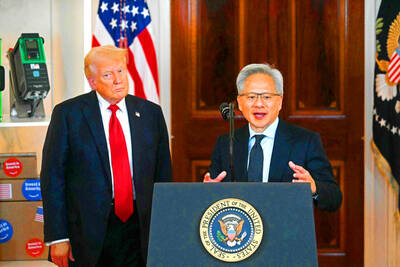In a reef just off the popular USS Kittiwake dive site in Grand Cayman, hunters armed with spears seek out lionfish — an invasive species so destructive that authorities want them caught and served up as a tasty dish.
With their striking pectoral fins and venomous dorsal spikes that fan out like a lion’s mane, the lionfish have few natural predators and eat up smaller fish, shrimp and crab that protect the reef.
The Cayman Islands are fighting back with a campaign that encourages local divers to hunt lionfish — which number in the tens of thousands — so that restaurants can serve them up to tourists.

Photo: Reuters
Call it the “if you can’t beat ‘em, eat ‘em” approach.
Lionfish has begun to match grouper, snapper and mahi-mahi as a delicacy in Cayman, where more than a dozen restaurants now have them on the menu.
“Boy, are they good to eat,” said celebrity Spanish chef Jose Andres, who went hunting during a Cayman Cookout event. “Their sweet, white meat is unbelievable as a ceviche or sauteed with fresh herbs,” he said.
After a diver speared one on a recent trip, a teenage girl on vacation from Texas inspected the foot-long (30.48cm) catch approvingly.
“I had lionfish tacos at Tukka,” she said of a restaurant on the island.
Thomas Tennant, a chef for the upscale Michael’s Genuine Food & Drink, now buys 120 pounds (54.4kg) of lionfish a week from local divers at US$5.50 a pound, serving diners a variety of dishes from raw, to a sandwich and a main course.
Native to the Indo-Pacific, lionfish are believed to have spread after some escaped from a private aquarium in south Florida during Hurricane Andrew in 1992.
They have since migrated throughout the warm waters of the Gulf of Mexico, the Caribbean and even the eastern US seaboard as far as Rhode Island, where they die in winter.
The fish are small and only 40 percent of the body is edible meat after removing the head, spines and bones, meaning time-consuming work for chefs.
The concept of eating them has caught on elsewhere too. A Lionfish Festival, dubbed “Feast on the Beast” was held last month in southwest Florida with local chefs in Fort Myers cooking up 90kg of lionfish fillets to benefit a local charity.
There is no way to calculate the size of the invasion.
“The number would be astounding,” said Lad Akins, director of special projects at REEF, an ocean conservation nonprofit based in the Florida Keys.
Site densities of 3,000 lionfish in an area roughly the size of a US football field have been found in the Caribbean and the Gulf of Mexico, he said.
A commercial lionfish export company, Spinion Ltd, created in the Cayman Islands in 2012, sells an average of 90kg to 115kg a week to five local restaurants.
With rising demand, some restaurants, including Guy Harvey’s, are now importing lionfish from Honduras.
“We didn’t have enough lionfish here to satisfy the customer,” manager Bruno Deluche said.

Taiwan Semiconductor Manufacturing Co (TSMC, 台積電) last week recorded an increase in the number of shareholders to the highest in almost eight months, despite its share price falling 3.38 percent from the previous week, Taiwan Stock Exchange data released on Saturday showed. As of Friday, TSMC had 1.88 million shareholders, the most since the week of April 25 and an increase of 31,870 from the previous week, the data showed. The number of shareholders jumped despite a drop of NT$50 (US$1.59), or 3.38 percent, in TSMC’s share price from a week earlier to NT$1,430, as investors took profits from their earlier gains

AI TALENT: No financial details were released about the deal, in which top Groq executives, including its CEO, would join Nvidia to help advance the technology Nvidia Corp has agreed to a licensing deal with artificial intelligence (AI) start-up Groq, furthering its investments in companies connected to the AI boom and gaining the right to add a new type of technology to its products. The world’s largest publicly traded company has paid for the right to use Groq’s technology and is to integrate its chip design into future products. Some of the start-up’s executives are leaving to join Nvidia to help with that effort, the companies said. Groq would continue as an independent company with a new chief executive, it said on Wednesday in a post on its Web

CHINA RIVAL: The chips are positioned to compete with Nvidia’s Hopper and Blackwell products and would enable clusters connecting more than 100,000 chips Moore Threads Technology Co (摩爾線程) introduced a new generation of chips aimed at reducing artificial intelligence (AI) developers’ dependence on Nvidia Corp’s hardware, just weeks after pulling off one of the most successful Chinese initial public offerings (IPOs) in years. “These products will significantly enhance world-class computing speed and capabilities that all developers aspire to,” Moore Threads CEO Zhang Jianzhong (張建中), a former Nvidia executive, said on Saturday at a company event in Beijing. “We hope they can meet the needs of more developers in China so that you no longer need to wait for advanced foreign products.” Chinese chipmakers are in

POLICY REVERSAL: The decision to allow sales of Nvidia’s H200 chips to China came after years of tightening controls and has drawn objections among some Republicans US House Republicans are calling for arms-sale-style congressional oversight of artificial intelligence (AI) chip exports as US President Donald Trump’s administration moves to approve licenses for Nvidia Corp to ship its H200 processor to China. US Representative Brian Mast, the Republican chairman of the US House Committee on Foreign Affairs, which oversees export controls, on Friday introduced a bill dubbed the AI Overwatch Act that would require the US Congress to be notified of AI chips sales to adversaries. Any processors equal to or higher in capabilities than Nvidia’s H20 would be subject to oversight, the draft bill says. Lawmakers would have